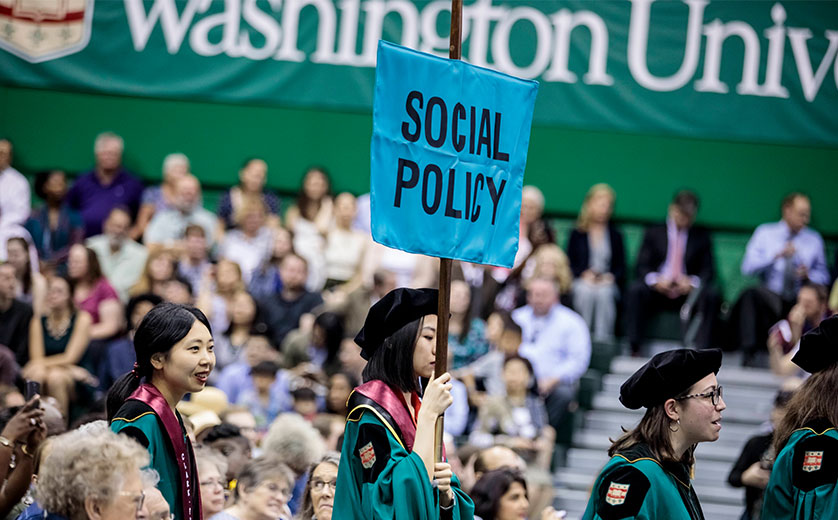The Brown School has ushered in a new era of social policy marked by key initiatives in social policy education, research, and community engagement. This includes the launch of the standalone Master of Social Policy (MSP) degree, the integration of two prominent research centers, and the continued work of the Clark-Fox Policy Institute. These efforts collectively demonstrate the school’s dedication to addressing oppressive structural systems through the development and implementation of evidence-informed policy solutions aimed at advancing equity.
Previously offered only as a dual degree, the MSP is now a focused, one-year, skills-based option designed specifically for policy professionals. This change is aimed at preparing graduates to navigate the increasingly complex landscape of policymaking.
With over 100 dual degree graduates to date, this new format welcomes students from diverse academic backgrounds, including those with bachelor’s, master’s, and doctoral degrees.
Anna Goldfarb Shabsin, teaching professor and assistant dean of the MSP program, highlighted the program’s comprehensive curriculum, covering all facets of policy work—from advocacy and negotiation to evaluation and economic decision-making. “Our MSP alumni are making a difference across all levels of government, serving as advocates, lobbyists, economists, evaluators, and strategists,” Shabsin said.
The new MSP degree is part of Dean Dorian Traube’s broader vision for the Brown School. Traube, the Neidorff Family and Centene Corporation Dean of the Brown School and Professor, has made social policy a cornerstone of her leadership, underscoring the historical role of social workers in shaping key policies like Social Security and child welfare.
“This is an exciting opportunity for us and represents a new path to cultivate Brown School leaders who are changemakers on issues of great societal significance,” she said.
During her installation speech in February 2024, Traube called on the Brown School community to take the lead in crafting a new social contract—one that defines how we care for each other and our society. She pointed to the crises of recent years—COVID, economic instability, and intersecting challenges in public health, education, and labor—as a wake-up call that America’s systems of worth, stability, and achievement are deeply flawed.
“We are at a critical point where we must examine what our society owes the individual, and what the individual owes in return,” she remarked. “I contend that the Brown School, a place of geographic, historic, and cultural confluence is the place where this can occur.”
She concluded with a call to action: “We must have ambition to lead, ambition to solve, and ambition to serve.”
Advancing research and social impact
In addition to introducing the new standalone MSP degree, the Brown School is enhancing its social policy reach by melding two key research centers. The faculty and staff of the Social Policy Institute (SPI) will join forces with the Brown School’s Center for Social Development (CSD), creating a powerhouse for research and policy innovation.
“Bringing the vital work of the SPI under the CSD umbrella and the synergies that are going to be made possible by this larger CSD team have me truly optimistic for the rigorous policy thought leadership and research that will be coming out of the Brown School in the years to come,” Traube explained.
Established in 2019, the SPI focuses on systemic policy issues and solutions, while CSD, founded in 1994 by Michael Sherraden, the George Warren Brown Distinguished University Professor, has led initiatives in asset-building, aging, voting rights, and expanding opportunities for marginalized communities.
Sherraden emphasized the significance of this integration, coinciding with both the 100th anniversary of the Brown School and the 30th anniversary of CSD.
“The integration of the Center for Social Development and the Social Policy Institute marks a promising new chapter at the Brown School. We look forward to still greater achievements in applied social research, education, and policy,” he said. “This expanded research team is grounded in shared commitments to advancing well-being through rigorous knowledge building and applying knowledge to policy innovations. We will contribute to policy under the theme of a New Social Contract. This renewed body of work will reflect the very best of the Brown School.”
Jason Jabbari and Stephen Roll, assistant professors and SPI co-directors, echoed Sherraden’s sentiments, expressing confidence that the integration will enhance the school’s capacity to transform research into actionable solutions.
“The SPI team is thrilled about merging with CSD, which has an amazing track record of creating real policy changes that impact the economic mobility of millions of people,” Roll said. “The CSD and SPI teams share many of the same priorities, values, and goals, and both organizations have incredibly talented staff and faculty that support them. We believe this merger will help cement CSD and the Brown school as leaders in social policy and help advance our efforts toward developing a new social contract that works for everyone.”
Jabbari added, “We look forward to working together to merge our respective organizations and to build something new and impactful together.”
Clark-Fox Policy Institute: A hub for policy engagement
The Brown School is also expanding its policy reach through the Clark-Fox Policy Institute (CFPI), which serves as a central hub for public policy engagement. Since its founding in 2017, CFPI has been amplifying community voices in academia and providing policymakers and the public with essential tools and data.
Through initiatives like the Graduate Policy Scholars program, which has trained more than 300 students, and original policy briefs on critical issues like voting rights and wage equity, CFPI is actively shaping policy discourse.
This October, the Brown School, in partnership with CFPI, hosted their inaugural professional development policy summit focused on equity. A second summit, titled Rainbow Resilience, and focused on advancing LGBTQ+ well-being, is planned for March, with New York Times op-ed columnist Charles M. Blow as the keynote speaker. The Brown School also hosts the Macro United Conference, the only national event dedicated to faculty engaged in macro social work, policy practice, and research. The Brown School will host the 2025 Macro United Conference from May 29-May 31.
